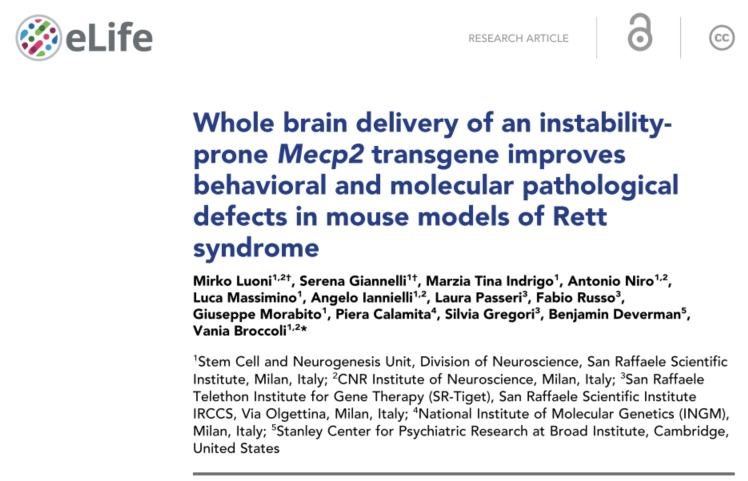RiboLace
6 February 2024
Whole brain delivery of an instability-prone Mecp2 transgene improves behavioral and molecular pathological defects in mouse models of Rett syndrome

Luoni M, Giannelli S, Indrigo MT, Niro A, Massimino L, Iannielli A, Passeri L, Russo F, Morabito G, Calamita P, Gregori S, Deverman B, Broccoli V. Whole brain delivery of an instability-prone Mecp2 transgene improves behavioral and molecular pathological defects in mouse models of Rett syndrome. Elife. 2020 Mar 24;9:e52629. doi: 10.7554/eLife.52629. PMID: 32207685; PMCID: PMC7117907.
Rett syndrome is an incurable neurodevelopmental disorder caused by mutations in the gene encoding for methyl-CpG binding-protein 2 (MeCP2). Gene therapy for this disease presents inherent hurdles since MECP2 is expressed throughout the brain and its duplication leads to severe neurological conditions as well. Herein, we use the AAV-PHP.eB to deliver an instability-prone Mecp2 (iMecp2) transgene cassette which, increasing RNA destabilization and inefficient protein translation of the viral Mecp2 transgene, limits supraphysiological Mecp2 protein levels. Intravenous injections of the PHP.eB-iMecp2 virus in symptomatic Mecp2 mutant mice significantly improved locomotor activity, lifespan and gene expression normalization. Remarkably, PHP.eB-iMecp2 administration was well tolerated in female Mecp2 mutant or in wild-type animals. In contrast, we observed a strong immune response to the transgene in treated male Mecp2 mutant mice that was overcome by immunosuppression. Overall, PHP.eB-mediated delivery of iMecp2 provided widespread and efficient gene transfer maintaining physiological Mecp2 protein levels in the brain.
Keywords: AAV; gene therapy; intellectual disabilities; mouse; neuronal disease; neuroscience.

